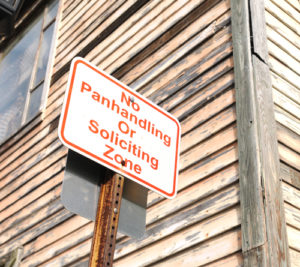
Panhandling, homelessness and what can government do about them were topics of discussion yesterday for the Escambia Board of County Commissioners.
The BCC did pass a stricter Panhandling ordinance that updated prohibitions in Community Redevelopment Areas and established a prohibition on panhandling one half-mile in each direction of 1-10 and 1-110.
At their Thursday morning agenda review session, the commissioners recognized the complexity of the issue and that some use the area’s high homeless numbers to operate what Commissioner Grover Robinson called an “unregulated business.â€
Commissioner Doug Underhill recognized that homelessness is an issue but added, “It has become a top cover for an element that masquerades as homeless.â€
Robinson voiced concern that the panhandlers were interfering with businesses near where they congregate. “Panhandling is a business (for some)… What we continue to deal with is non-regulated businesses (panhandlers) interfering with those who actually take the time to be regulated and comply with the rules,†said Robinson. He felt the ordinance was necessary to protect those business that have invested in the area.
There was some discussion about earmarking additional funding to the Escambia County’ Sherriff’s office for adding a deputy to focus on panhandling, but Chief Deputy Eric Haines objected to that proposed strategy.
“Respectfully, it’s outside the purview of the Board of County Commissioners to allocate fund to tell a deputy what to do,†said Haines. “One deputy won’t solve our homeless issues. It’s a societal issue.â€
He said that one reason Escambia County may be dealing with more panhandlers lately is because Mobile, Ala. has gotten stricter in how it deals with the problem.
Commissioner Lumon May supported the stricter ordinance but asked staff to develop a measuring tool to determine its impact. “As long as we have high homelessness, high poverty and low graduation rates, we will have this problem,†said May. “We have no data to show any of this will work.â€
Chief Deputy Haines said that another part of the panhandling issue may be that this community enables them. Underhill agreed.
“Panhandling will exist as long as people in this county feed panhandlers,†said Underhill. “We need an effort on the part of the county to educate the public about panhandling.â€
He suggested the education program could give the public different strategies on how to help the homeless.
Across town yesterday, author Robert Lupton was helping leaders and outreach agencies develop just such a strategy. He wrote “Toxic Charity: How Nonprofits Hurt Those They Help (And How to Reverse It),†a faith-based book on changing charitable outreach. He encourages a “charity with dignity†concept, where the underprivileged are given an opportunity to earn what they receive, as well as form relationships with those who are helping them.
Mollye Barrows and Pensacola Today have been outliers on this topic. Barrows and Michael Spooneybarger’s collaborated on story last month on how one community is using Lupton’s ideas.
Stay tuned to see if there is any follow-up on the county’s education program and Lupton’s strategies.



